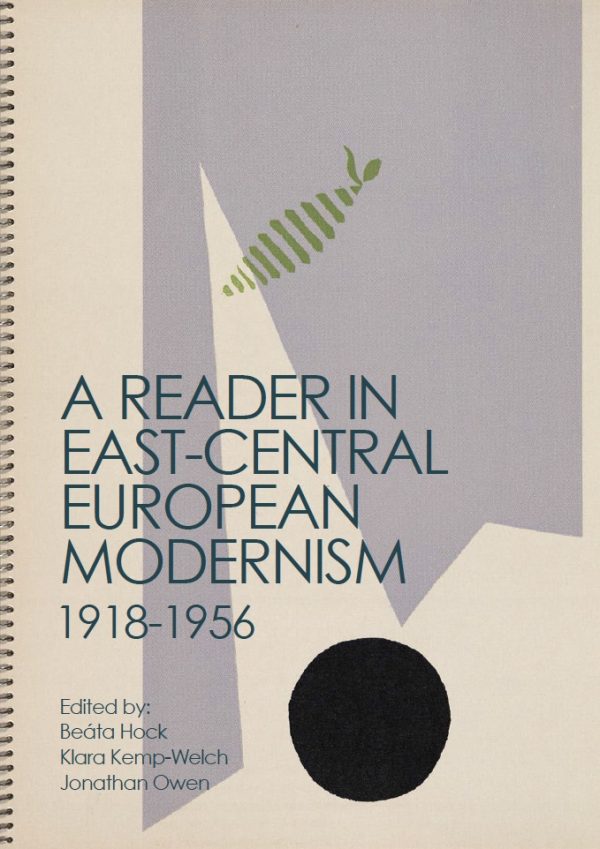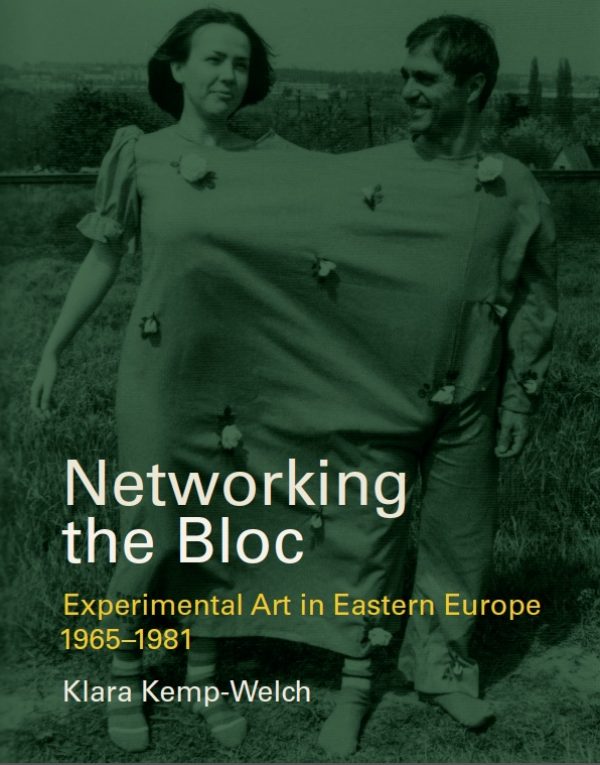Klara Kemp-Welch is a scholar of modern and contemporary art with a specialism in Eastern European art and international relations. She was educated at the School of Slavonic and East European Studies and University College London. Having largely focused on cultural dissidence of the 1960s and 1970s for the first part of her career, and then moved on to transnational and transregional methodologies in pan-European Modernism and networking Eastern Europe and Latin America, most recently, she has turned her attention to contemporary art, with a focus on documentary and video-based practices and questions of labour migration, minority experiences, human rights and border politics. She is currently completing a monograph entitled Free Movement? Migration and Mobility in Eastern Europe through the Lens of Contemporary Art, structured in three parts: 1. Labour Migration 2. Displacement 3. Border Politics. She has presented papers and published several essays and articles relating to this new material, including ‘The Art of Heading East on a “Continent Moving West”’ in Jakub Gawkowski (ed.) Die Sonne nie swieci tak jak slonce, exh. cat. (Szczecin: Trafostacja Sztuki, 2021), ‘Night Cleaning at the Bank: Sanja Iveković’s Screen Tests for Invisible Women’, Thinking Art 2. Materialisms, labours, forms, Peter Osborne (ed.), CRMEP, 2020 and ‘“The Romanians are Coming”: Labour Migration and the Politics of the Observational Documentary’, Third Text vol. 34 (July 2020).
She is the author of two monographs. Networking the Bloc: Experimental Art in Eastern Europe, 1965-1981 (MIT Press, 2019) offered the first networked survey of the experimental zeitgeist in Eastern European art, examined through personal encounters and collaborative exchanges, using archival material gathered in twelve countries to counter Cold War narratives of Eastern-bloc isolation. The Art Journal reviewer described it as a ‘companiable guide through the complex transnational art worlds of Eastern Europe’ which ‘brilliantly investigates local primary materials within an international artworld setting’. A reviewer of her earlier monograph, Antipolitics in Central European Art. Reticence as Dissidence under Post-Totalitarian Rule (IB Tauris, 2014; Bloomsbury, 2017) wrote that ‘Kemp-Welch’s contributions as a scholar who persistently engages the complex intersections of art and politics in the former East… will… spark productive debates while setting a high bar for anyone who wants to weave together theoretical insights, sociopolitical contexts, transnational geographies, and wide-ranging erudition in and beyond the visual arts’.
She is co-editor of A Reader in East-Central-European Modernism, 1918-1956 (Courtauld Books Online, 2019) comprising 27 essays, the first survey of secondary literature on East-Central European art, and of a special issue of ArtMargins on ‘Artists Networks in Eastern Europe and Latin America’ (2012), which pioneered cross-regional research in these two previously under-researched fields. Her work has contributed to establishing The Courtauld as a centre for the study of East-European art, Latin American art, and Cold War art, integrating East and West-European perspectives, redressing Cold War-era historical biases in the discipline and foregrounding transnational approaches. She promotes methodological innovation and curricular diversity, emphasising art history’s entanglements with global affairs and social justice, reinvigorating the Institute’s long-standing engagement with the social history of art.
Current PhD Supervision
Hannah Healey, Artists for Democracy 1974-1977: International Solidarity in Britain (2022–)
Smaranda Ciubotaru, Threads of Subversion in Romanian Textile Art of the Ceaușescu Era 1965-1989 (2023–)
Rada Georgieva, ‘Parallel Cultures’: Mail Art Magazines and Samizdat Editions from Eastern Europe and Latin America 1970-95 (2023–)
Past PhD Supervision
Alice David, Cultures of Resistance: Graphic Art and the Avant-Garde in 1970s’ Latin America (2024)
Ana-Gabriela Rodriguez, Puerto Rican Graphic Arts and the Cold War: Bridging Workshops and Crossing Borders, 1950- 1970, (2024)
Katia Denysova, Fragmented Identities: Between Cosmopolitanism and Nationalism in Ukraine’s Early 20th Century Art, (2024)
Anya Smirnova, Net Art East: Postsocialist Artists and New Media 1989- 1999, (2024)
Wiktor Komorowski, The Reversed Power of the Image: Exhibitions of Graphic Art in Eastern Europe during the Cold War (2023)
Chelsea Pierce, The Gorgona Paradigm: Private Art Practice in Socialist Yugoslavia (2022)
Sofia Gurevich, The Form and Content of the early Soviet Book: A study through the country’s publishing industry institutions of the 1920s and 1930s (2020)
Svitlana Biedarieva, Challenging the Urban Legacies of the Olympics: Mexico City 1968-1994 and Moscow 1980-1991 (2019)
Claudia Zini, Bosnia and Herzegovina: Contemporary Art from a Post-Conflict Society (2019)
Malgorzata Misniakiewicz, (Art) Solidarity – An International Project: Polish Mail Art Exchanges with Eastern Europe (2018)
Julia Maria Secklehner, “Czechs” vs. “Austrians” National Identity in Caricature 1918-193 (2018)
Marko Ilic, For a ‘Self-Managing’ Art: The ‘New Art’ Seen through Yugoslavia’s Student Cultural Centres (2016)
Research interests
Klara Kemp-Welch’s current research is on representations of migration, mobility and war in contemporary documentary and participatory art. She also writes on international relations and experimental art of the 1960s-80s. In both cases her focus is repositioning Central and Eastern European art and life within the global field.
Publications
Authored Books
Networking the Bloc. Experimental Art in Eastern Europe 1965-1981 (Cambridge, Massachusetts, and London, England: MIT Press, 2019), 480pp.
Antipolitics in Central European Art 1956-1989 (New York and London: I.B. Tauris / Bloomsbury, 2014 hardcover; 2017 paperback), 325pp.
Edited Book
Beata Hock, Klara Kemp-Welch and Jonathan Owen, A Reader in East-Central-European Modernism 1918-1956 (London: Courtauld Books Online, 2019), 436pp.
Edited Special Issue
Cristina Freire and Klara Kemp-Welch (eds), Artists’ Networks in Eastern Europe and Latin America, ARTMargins 2 (June-October 2012), 220pp.
Peer-reviewed articles and chapters in academic journals and edited volumes
‘Countercultural Misunderstandings: Alternative Art and Cold War Politics’, Art History, Vol 45, Issue 5, special issue Vivian Li (ed.) Red Networks: Post-War Art Exchange (Nov. 2022), 1126-1147.
‘Night Cleaning at the Bank: Sanja Iveković’s Screen Tests for Invisible Women’, Thinking Art 2. Materialisms, labours, forms, Peter Osborne (ed.), CRMEP, 2020.
‘“The Romanians are Coming”: Labour Migration and the Politics of the Observational Documentary’, Third Text vol. 34 (July 2020).
‘Affirmation and Irony in Endre Tót’s Actions of the 1970s’, Art History & Criticism 3, 2007, 136-144 [Reprinted as ‘Endre Tot’s Joys and Zeros’, Arta 20-21 (2016)].
‘Excursions in Communist Reality: Tadeusz Kantor’s Impossible Happenings’, Object: Graduate Research and Reviews in the History of Art and Visual Culture 8 (2005/2006), 45-65.
Non-refereed articles and chapters in academic journals and edited volumes
‘Black Rain: Kateřina Vincourová’s Reparative Interventions’ in Julia Bailey (ed), Kateřina Vincourová: Skin Care, exh. cat. forthcoming (Prague: Galerie Rudolfinum, 2025).
‘Into the Vortex: Edita Schubert’s Anxious Visions of the early 1980s’ in David Crowley (ed.), Edita Schubert, forthcoming 2025.
‘Ilona Keseru and the Community of the Abstract’ in Agata Jakubowska and Minoka Zsikla (eds), Ilona Keseru: Flow, (Susch: Muzeum Susch, 2024), 61-72.
‘ “Live Information”: Letters to Attalai’ in David Feher (ed), Gábor Attalai, exh. cat. (Veszprem: House of Arts Veszprem, 2024), 116-128.
‘Communication at a Distance: Eastern European Art and the ‘Section des envois’ at the 1971 Paris Biennial, in Elitza Dulguerova (ed.), La Biennale internataionale des jeunes artistes. Paris (1959-1985), Paris: editions de l’INHA / Dijon, Les Presses du reel), 2023.
‘Painting Blindly: Gili Mocanu and the Circus of Appearance’ in Dan Popescu (ed.), GM. (Bucharest: H’art: Editura Velant, 2021).
‘The Art of Heading East on a “Continent Moving West”’ in Jakub Gawkowski (ed.) Die Sonne nie swieci tak jak slonce, exh. cat. (Szczecin: Trafostacja Sztuki, 2021).
‘Nicht ganz zu Hause? Osteuropäische Künstlerinnen und Künstler auf der documenta 1 bis 10’ / ‘Not Quite at Home? Eastern European Artists at Documentas 1-10’, in Raphael Gross mit Lars Bang Larsen, Dorlis Blume, Alexia Pooth et al. (eds), documenta. Politik und Kunst, exh. cat. (Berlin: Deutsches Historisches Museum, 2021), pp. 208-216.
‘NET: An Open Proposition’, e-flux ♯ 98 (March 2019).
‘Esprit de Corps: Collaborative Activities 1971-7’, in Juliet Bingham (ed.), Dora Maurer, exh. cat. (London: Tate, 2019), 10-15.
‘Reckoning with History’ in Roxana Marcoci, Ana Janevski and Ksenya Nouril (eds), Art and Theory of Post-1989 Central and Eastern Europe: A Critical Anthology (New York: MoMA, 2018), 19-21.
‘Soft-Spoken Encounters: International Exchanges and the Hungarian “Underground’’’ in Edit Sasvari (ed.), Art in Hungary 1956-1980. Doublespeak and Beyond (London: Thames and Hudson, 2018), 273-291.
‘International Relations at the Foksal Gallery’, in Galeria Foksal 1966-2016 (Warsaw: Galeria Foskal, 2016), 68-80.
‘Species of Spaces in Eastern European and Latin American Experimental Art’, MoMA Post, 2015.
‘Impossible Interviews with Ceausescu: Ion Grigorescu and the Dialogic Imagination’, in Alina Serban (ed.), Ion Grigorescu. The Man with a Single Camera (Berlin and New York: Sternberg Press, 2013), 158-184. (Translated into Romanian and reprinted in Arta 14-15, 2016, 52-58).
‘Jordan McKenzie and the Rhetoric of Power’ in Jordan McKenzie, exh. cat. (London: Arts Council of England; York: Yorkshire Sculpture Park, 2014).
‘Autonomy, Solidarity and the Politics of NET’, in Bozena Czubak (ed.), NET. The Art of Dialogue / NET. Sztuka Dialogu (Warsaw: Fundacja Profil, 2013), 46-56.
‘Art Documentation and Bureaucratic Life: The ‘Case’ of the Studio of Documentation, Activities and Propagation’ in Lukasz Ronduda and Georg Schollhammer (eds), KwieKulik (Vienna: JPR Ringier, March 2013), 515-517.
‘Emancipation and Daydreams: Kantor’s Happenings’ in Katarzyna Murawska-Muthesius (ed.) An Impossible Journey: The Art and Theatre of Tadeusz Kantor (London: Black Dog Publishers, 2011), 140-147.
‘Articulating the Between: Henryk Stażewski’s Critical Spaces’, in Gabriela Switek (ed.), Avant-garde in the Bloc (Warsaw: Fundacja Galerii Foksal; Vienna, JPR Ringier, 2010), 294-317.
‘Jiří Kovanda’s Collisions’, in Margaret Iversen, (ed.), Chance. Documents of Contemporary Art Series (London: Whitechapel Gallery; Cambridge Mass. and London: MIT Press, 2010), 147-149.
‘Attacking Objectification: Jerzy Bereś in Dialogue with Marcel Duchamp’ in Mel Jordon and Malcolm Miles (eds), Art Theory and Post-Socialism (Bristol UK and Portland USA: Intellect Books, 2008), 21-31.
‘Who’s Afraid of Neo-Socialist-Realism?’, in Stefan Constantinescu. An Infinite Blue, exh. cat. (London: GALERIE8, 2011), 43-56.
‘Understanding Jerzy Bereś’s Manifestations’ in Jerzy Bereś: Sztuka zgina życie / Art Bends Life, exh. cat. (Kraków: Bunkier Sztuki, 2007), 23-31; 35-53
‘Jerzy Bereś’s Radical Expansion of the Readymade Event’, in Jerzy Bereś: Sztuka zgina życie / Art Bends Life, exh. cat. (Kraków: Bunkier Sztuki, 2007), 35-53
Short works
Katia Denysova, Klara Kemp-Welch et Maria Mileeva, « In the Eye of the Storm », Critique d’art, 60 | 2023, 115-127.
‘Géza Perneczky’s “Concepts like Commentary” (1971)’, in Barbora Ropkova (ed.), The Kunsthalle Praha Collection. 50 Highlights (Prague: Kunsthalle Praha), 2023.
‘Presence, Radiance, Pulsation: Ilona Keseru’s Restless Objects’ in Ilona Keseru (London: Stephen Friendman Gallery, 2022).
‘Studio Visit’ in Igor Bloch (ed.), Beachgoers (Warsaw: Drukarnia Akapit, 2018).
‘Reconstruction’, Special Issue VAC Foundation, Venice, ‘Space Force Construction’, ArtReview (May 2017).
‘KwieKulik’s Monument without a Passport (1978)’ in Critique and Crisis. European Cultural Discourses since 1945. XXX Council of Europe Exhibition, electronic exh. cat. (Berlin: Deutsches Historisches Museum, 2012).
‘S.O.S. Socialist Occupation of the Subject’, in Lukasz Ronduda, Alex Farquharson, and Barbara Piwowarska (eds), Star City. The Future under Communism (Warsaw: MAMMAL Foundation; Nottingham Contemporary; transit.at, 2011), 70-80.
‘Paradoxical Dissidence’ Ludlow 38 broadsheet, New York: Goethe Institute, November 2009 (also published as ‘Paradoxial Dissidence’ in Tobi Maier (ed.), Július Koller & Jiří Kovanda (New York: Ludlow 38, 2009).
Review Articles
‘Ricochets: Ukrainian Solidarity and Resilience at the 60th Biennale di Venezia’, ArtMargins online (June 2024).
‘Resurrections (Kabakov’s Slippers). Moscow Conceptualism for Delayed Audiences’, Oxford Art Journal 35. 2. 2012, 298-301.
‘Polish Conceptualism: Expanded, Politicised, Contested’, Artmargins online (February 2010).
‘Taking Women’s Rights Seriously? “Sanja Ivekovic. Urgent Matters”, BAK, Utrecht / VanAbbe Museum, Eindhoven’, Third Text, Vol. 23, Issue 6 (November 2009).
‘ “Aernout Mik. Shifting, Shifting”, Camden Arts Centre, London’, Object: Graduate Research and Reviews in the History of Art and Visual Culture, no. 10, London: University College London, 2008.
Reviews of Single Academic Books
‘Agata Jakubowska and Magdalena Radomska (eds) Horizontal Art History and Beyond: Revising Peripheral Critical Practices (New York and London, Routledge, 2022)’, note de lecture, Critique d’Art (December 2024).
‘Agata Pietrasik, Art in a Disrupted World. Poland 1939-1949 (New Histories of Art, Warsaw: Academy of Fine Arts in Warsaw; Museum of Modern Art in Warsaw, 2021)’, note de lecture, Critique d’Art (November 2022).
‘Annette Michelson, On the Wings of Hypothesis: Collected Writings on Soviet Cinema (Cambridge MA: MIT Press, 2020)’, note de lecture, Critique d’Art (June 2022).
‘Themerson Archive: Vol. 1 Letters and documents, Vol. 2 The Themersons, Vol. 3 Gaberbocchus, Jasia Reichardt and Nick Waddley (eds) (London: Themerson Estate; Cambridge MA: MIT Press, 2020)’ note de lecture, Critique d’Art (June 2022).
‘Maria Amalia Garcia, Abstract Crossings: Cultural Exchange between Argentina and Brazil, trans. Jane Brodie (Oakland, California: University of California Press, 2019)’, review, Critique d’Art (June 2021).
‘Jasia Reichardt, Quinze voyages de Varsovie à Londres 1940-1945 (Paris: Ed. de la revue Conférence, 2018)’, review, Critique d’Art (November 2019).
‘Tomaš Pospiszyl, An Associative Art History. Comparative Studies of Neo-Avant Gardes in a Bipolar World (Prague, JRP Ringier; Les Presses du Reel, 2017)’, review, UMĚNÍ ART (6 LXVII 2019), 600-603.
‘Physical Immortality for All! Boris Groys (ed.) Russian Cosmism (New York, New York: e-flux; Cambridge, Massachusetts and London, England: MIT Press, 2018)’, review, Art Review Asia (April 2018)
‘Pavlína Morganová, Czech Action Art: Happenings, Actions, Events, Land Art, Body Art and Performance Art Behind the Iron Curtain (Prague: Karolinum Press, Charles University, 2014)’, review, UMĚNÍ ART (5 LXII, 2015), 417-420.
‘Amy Bryzgel, Performing the East: Performance Art in Russia, Latvia and Poland since 1980 (London and New York: I.B. Tauris. 2013), review, ArtMargins (April 2016).
‘Edit Andras (ed.) Transitland. Video Art from Central and Eastern Europe 1989-2009’, review, Artmargins (January 2011).
Exhibition Reviews
‘Geta Bratescu, Liverpool’, The Burlington Magazine, CLVII (Sept 2015), 644-646.
‘54th Venice Biennale, various venues, Venice’, Art Monthly #348 (July-August 2011).
‘Hito Steyerl. In Free Fall. Chisenhale Gallery, London’, Art Monthly #342 (Dec. 2010- Jan. 2011).
‘”Olga Chernysheva”, Calvert 22, London’, Enclave 2 (November 2010).
‘Touched. Liverpool Biennial. International Festival of Contemporary Art, Liverpool’, Art Monthly #341 (Nov. 2010).
‘History of Art, The. Curators’ Series #3. Mihnea Mircan, David Roberts Art Foundation, London’, Art Monthly #337 (June 2010).
‘Angela de la Cruz: After / Anna Maria Maiolino: Continuous. Camden Arts Centre, London’, Art Monthly #336 (May 2010).
‘Journeys with No Return. A Foundation, London’, Art Monthly #335 (April 2010).
‘KwieKulik. Form is a Fact of Society. Galeria Awangarda, BWA Wroclaw’, Art Monthly #334 (March 2010).
‘Aernout Mik Shifting Shifting, Camden Arts Centre, London, 16 February -15 April 2007’, OBJECT 10 (2007)




